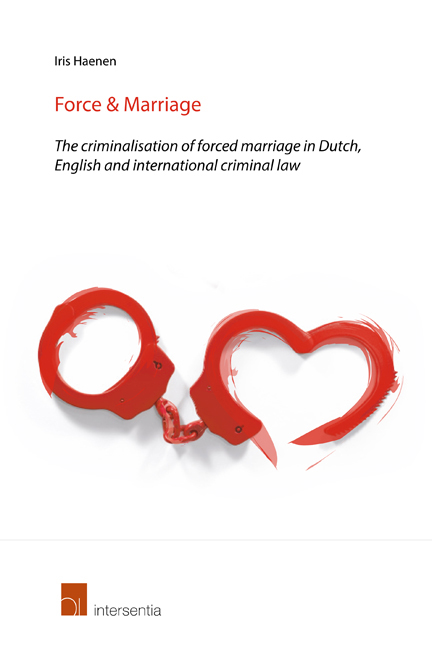 Force & Marriage
Force & Marriage Book contents
- Frontmatter
- Acknowledgements
- Contents
- Abbreviations
- General introduction
- PART I FORCE AND MARRIAGE: Description and definition of forced marriage
- Chapter 1 Consensus facit nuptias
- Chapter 2 Forced marriages in the Netherlands and England
- Chapter 3 Forced marriages in conflict situations
- PART II A TALE OF TWO THEORIES: Criminalisation on the level of national law and international law
- PART III THE LAW AND FORCED MARRIAGE: Legal frameworks concerning forced marriage in Dutch, English and international criminal law
- PART IV ANALYSIS AND CONCLUSIONS
- Summary
- Bibliography
- Table of cases
- Curriculum vitae
- Index
Chapter 3 - Forced marriages in conflict situations
from PART I - FORCE AND MARRIAGE: Description and definition of forced marriage
Published online by Cambridge University Press: 22 November 2017
- Frontmatter
- Acknowledgements
- Contents
- Abbreviations
- General introduction
- PART I FORCE AND MARRIAGE: Description and definition of forced marriage
- Chapter 1 Consensus facit nuptias
- Chapter 2 Forced marriages in the Netherlands and England
- Chapter 3 Forced marriages in conflict situations
- PART II A TALE OF TWO THEORIES: Criminalisation on the level of national law and international law
- PART III THE LAW AND FORCED MARRIAGE: Legal frameworks concerning forced marriage in Dutch, English and international criminal law
- PART IV ANALYSIS AND CONCLUSIONS
- Summary
- Bibliography
- Table of cases
- Curriculum vitae
- Index
Summary
INTRODUCTION
All is fair in love and war. This statement still seems to be true today. In conflict situations, the taking of brides by the victor is a common occurrence. Through the years, many conflicts around the world have been marked by the abduction of women and girls who were forced into what is generally referred to as ‘marriages’ with their captors. There are reports of forced marriages taking place during the conflicts in inter alia Afghanistan, Angola, Cambodia, the Democratic Republic of Congo, East Timor, Guatemala, Kashmir, Liberia, Mozambique, Myanmar, Peru, Rwanda, Sierra Leone, Somalia, Sudan (Darfur), and Uganda. This chapter focuses on the phenomenon of forced marriages in the situations that have been or are being tried before the ICTY, ICTR, ICC, SCSL and ECCC with an emphasis on the forced marriages that took place during the civil war in Sierra Leone and under the Khmer Rouge in Cambodia. As was stated in the General Introduction, this book focuses on these two situations because of the high prevalence of forced marriage during the two conflicts. In addition, the conflict of Sierra Leone was chosen because it resulted in the first case law concerning the act of forced marriage under international criminal law.
In this chapter, first, acts of forced marriage during the Rwandan genocide and the conflicts in the former Yugoslavia are discussed. The third paragraph focuses on situations currently before the ICC. The practice of forced marriage was (or is) prevalent to some extent in all situations, but in some more than in others. The conflict in Uganda is especially infamous for the high number of child abductions coupled with forced marriages and this particular topic has been well-documented. Therefore, paragraph 3 will mainly focus on Uganda. The situations in other countries under investigation by the ICC are briefly discussed, mainly for the practical reason that there is little information on (the prevalence of) forced marriages taking place in those situations.
- Type
- Chapter
- Information
- Force & MarriageThe criminalisation of forced marriage in Dutch, English and international criminal law, pp. 65 - 116Publisher: IntersentiaPrint publication year: 2014
